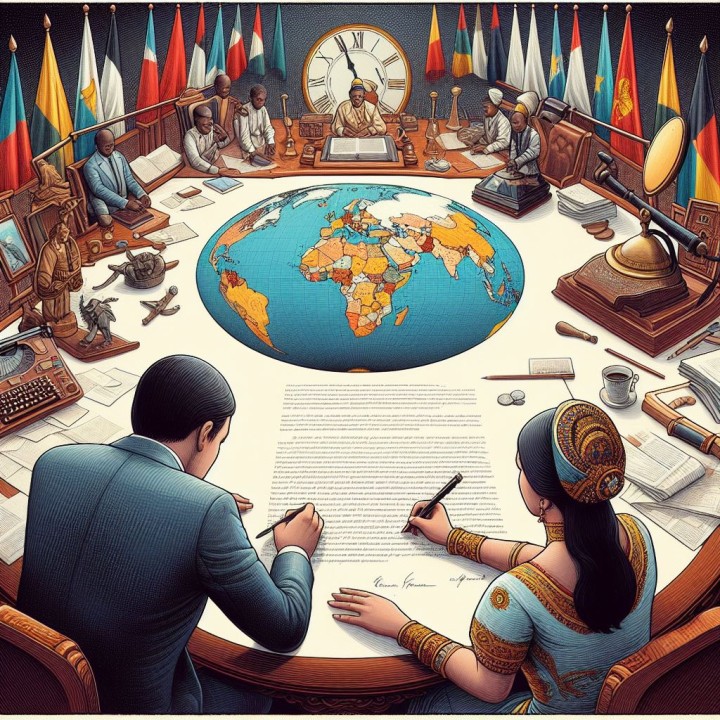
Posted on March 24, 2024
By Aboubakr Kaira Barry, Founder and Managing Director at Results Associates, Bethesda, MD, USA.
Dear Prime Minister,
I extend my heartiest congratulations on the trust placed in you and wish you every success in tackling the forthcoming challenges. When Winston Churchill took the reins of the United Kingdom at the outset of the Second World War, he told the British, “I have nothing to offer but blood, toil, tears, and sweat.”
Guinea is grappling with structural issues that have been accumulating for over six decades. Drawing from Churchill’s spirit, the citizens should be aware that addressing these inherited issues necessitates dedication, sacrifice, and patience to enhance their living standards. However, the dilemma lies in the fact that you cannot expect citizens to make sacrifices if the leaders themselves are not prepared to do the same. Consequently, I propose the following seven suggestions which, I believe, can assist you in effecting a sustainable change.
1. Establish credibility among the citizens to gain their trust. As Abraham Lincoln, the esteemed leader of America (1861-1865), articulated, “In this age, in this country, public sentiment is everything. With it, nothing can fail; against it, nothing can succeed.” When the public trusts you, they will be hopeful of a brighter future, willingly make necessary sacrifices for a better tomorrow, and also exhibit patience for results. To gain this confidence, you must emphasize maximum transparency. The late U.S. Supreme Court Justice Lewis Brandeis declared, “Sunlight is the best disinfectant.” Here are some measures you might want to consider for transparency:
a. Request officials, including military leaders, to disclose their assets.
b. Enact an amnesty law absolving all corrupt acts prior to September 2021, excluding those related to mining contracts obtained through corruption to focus on the future.
c. Pass a law necessitating proof for assets acquired beyond the means of officials, presuming in the absence of such proof that money has been unjustly acquired. Singapore enacted this law, which has proven effective in fighting corruption. This law can be supplemented by seeking technical assistance to upgrade the capacity to fight corruption from the Singapore Corruption Practices Investigation Bureau, which is one of the best in the world.
d. Implement a law allowing a credible independent party to evaluate future mining contracts against the global benchmark to minimize the risk of undervaluing mineral rights.
e. Disclose the government’s revenues, particularly from mining, as well as the budget allotted to ministries and provinces. Ngozi Okonjo Iweala, Nigeria’s finance minister from 2010-2015, implemented this and citizens welcomed it.
2. Adopt E-Procurement to curb corruption in projects. As the largest purchaser of goods and services, making the government’s procurement process transparent and visible online is “one of the most effective ways of making government less corrupt and more effective,” according to Bjorn Lomborg’s “Best Things First”. He estimates that for every dollar spent on E-procurement in developing countries, there is a $38 return.
3. Seek autonomy in managing the economy and form an economic management team to deliver results. Generalissimo Chiang Kai-shek, Taiwan’s political and military leader from 1950 to 1975, did precisely this. He entrusted the economic management to a team of technocrats. As Daniel Yergin and Joseph Stanislaw wrote in “Commanding Heights”, “Chiang’s smartest move was to entrust economic policymaking to the ‘super technocrats’ – highly capable officials, many being scientists and engineers, who operated with minimal political interference.”
4. Ensure your own accountability for results in exchange for autonomy in managing the economy. For this, you need to:
a. announce your government’s targets;
b. conduct an independent performance audit; and
c. organize its discussion within three months following the year-end in a publicly televised meeting chaired by the Head of State to provide a platform for ministers to explain their performance relative to targets, and their plans for improvement. President Paul Kagame of Rwanda conducts this annually and it has yielded positive results.
5. Use the mining sector to drive economic growth. Guinea’s Simandou mine is the world’s largest mining project and the country also has the third-largest reserves of bauxite in the world. It can follow the example of Indonesia’s outgoing President Joko Widodo (2010-2024) who has changed the trajectory of his country using its mineral resources. According to the Financial Times article, “In charts: how the Joko Widodo era remade modern Indonesia’s economy” dated February 10, 2022, “Under Widodo…Indonesia’s economy has grown about 5 per cent every year… gross domestic product per capita has also climbed and is approaching a sweet spot of $5,000….One critical driver of growth has been Indonesia’s reserves of nickel, an important element of electric vehicle batteries. Widodo banned exports of nickel ore in 2019, part of a strategy to cultivate a domestic EV supply chain…. Customs data shows exports of nickel swelled from just $1.4bn in 2014 to nearly $22bn in 2022.” This has to be complemented by an ecosystem conducive to broad-based economic growth including infrastructure, human capital development, and effective regulations that reduce the cost of investing in the country.
6. Carry out structural administrative reforms to
a. Limit government functions to activities it alone can execute, such as providing public goods, and relinquishing those that can be handled by the private sector and NGOs, including divesting state-owned enterprises, particularly those incurring losses;
b. Scale down the government to roles directly relevant to security, justice, and job creation. Every ministry should undergo a test to determine their relevance to these objectives. Those affected should be compensated to facilitate their transition to different pursuits. Javier Milei, Argentina’s new president, reduced the number of ministries from 18 to 9 to enhance fiscal discipline;
c. Enhance the strength and quality of senior positions in the surviving ministries with the best available talent, by offering them market rate compensation and implementing a clear career progression metric to encourage staff attraction and retention.
7. Adopt a Stable Currency: The government covers expenses through taxes, borrowing, or printing money. The ability to print money encourages the expansion of the government since expenses can be covered by printing more money. However, this doesn’t increase the production of goods and services. It results instead in inflation which adversely affects everyone, especially the poorest. Guinea backing its currency with a foreign exchange reserve will achieve macroeconomic stability (low inflation, stable currency) which will encourage domestic saving and attract the foreign investment Guinea needs for its transformation. “For every Dollar we issue, there will be a currency board which guarantees that there is that amount in gold or foreign exchange in London or New York or some other place to back it. So the money won’t go down,” stated Lee Kuan Yew, its prime minister from 1965-1990, a practice Singapore initiated at independence in 1965 to institutionalize fiscal discipline.
Guinea is fortunate to be endowed with natural resources and a youthful population. With the right policies, honesty, and a meritocratic civil service to execute them, I am optimistic that better days lie ahead.
